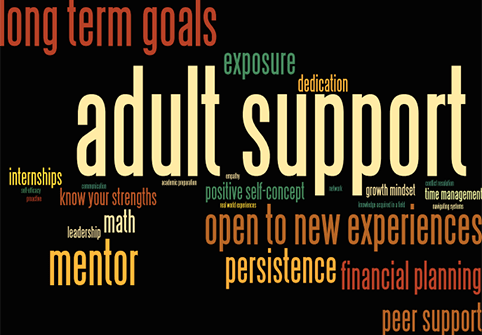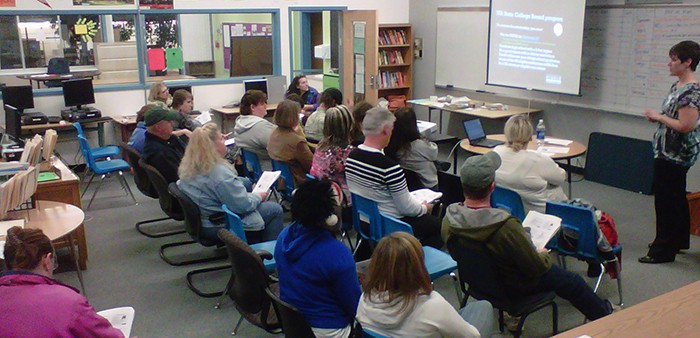Parental Involvement in Schools Matters: A Teacher’s Perspective

In the 11th and 12th grade, I had a student whose mother was in jail. He did not have much of a relationship with her. She had been incarcerated on and off for most of his life. One Friday afternoon, he told me she was going to be released. He had a car and planned to meet her after school across town.
All day, he was excited and nervous. Each time I talked with him, he said, “Bonnie (students called me by my first name), I get to see my mom today.”
On Monday, I held my breath as I asked him how his afternoon with his mother went.
“Oh, she never showed up,” he said. “But it’s cool…”
(She never showed up.)
His mom didn’t show up.
But, his dad did.
Fortunately for this student, his dad was a big part of his life. His dad was at the school frequently. He emailed me, texted me, and set up meetings to check on his son’s progress.
Not only was his dad an active part of his son’s life, he also mentored other students.
The father owned his own construction company, a field that interested many of other students. This student’s father agreed to be a mentor and take on other high school interns for his construction business.
This student’s father modeled that education is not just the responsibility of the parents and the teachers. Education is everyone’s business. (It’s also the title of a book by Dr. Dennis Littky, who co-founded Big Picture Learning where I worked as a school design coach).
In my eight years as a high school teacher and counselor, I attended countless meetings where parents were involved. I had the phone numbers of all my students’ parents (and grandparents, step-parents, guardians, and siblings) in my phone.
One time, I was counseling a student after school and these words came out of my mouth:
“______(student’s name). We need to talk. Hang on, I’m calling your grandmother…”
“Please don’t call my grandmother.”
I called his grandmother (which she had requested if there were issues with attendance or otherwise), putting her on speakerphone so she could be involved in the conversation I was having with her grandson.
Another time, I woke up hours before the school day began, met my principal at school, and drove to a McDonald’s to have a parent meeting over breakfast with a mom, one of my students, the principal, and my student’s two younger brothers, who were busily eating their Egg McMuffins.
We took a “we will meet you whenever and wherever” approach in order to ensure that parents, students and the educators were on the same page and working together for the student’s success.
Parental (and family) involvement is critical to student success in schools. We know this intuitively, and research confirms it. Parental involvement is associated with higher academic achievement outcomes and fewer behavioral problems.
Michael Levine, the founding director of the Joan Ganz Cooney Center at Sesame Workshop, wrote about the important role that families play in their children’s education:
“Research on young children’s developing brains and self-regulation as active learners is now aligned with decades of research by experts on school climate and parent engagement. Dr. Daniel Siegel, a pioneering neuro-psychiatrist at UCLA, recently observed: ‘studies of longevity, medical and mental health, happiness and even wisdom point to relationships as the most robust predictor of positive attributes in our lives across the lifespan.’ These insights align with what pioneers such as Dr. James Comer of Yale University pointed out over two decades ago. The power of school is enhanced or diminished by the types of relationships that are formed at the core of our educational enterprise. Teachers, parents, supervisors and students must be linked together in a relationship-rich environment that is open, flexible and which relentlessly promotes learning.”
Success happens when families, students and educators work together and holistically approach a child’s education, focusing on a child’s academic, social, and emotional needs.
So, what does real, meaningful, and collaborative parental involvement look like? Here are some ways to create meaningful parental involvement in our schools:
- Join the PTA…or not. Join if you have time and the desire, you can see how that goes. But don’t be certain that just because you are part of the PTA, you are having the right conversations. The PTA could also be a lot of organizing and planning that could distract from larger conversations that push the school to be better.
- Get to know the teacher(s). Ask about ways you can support your students goals and work over the course of the school year. Ask the teachers what their goals are for your student, and what the goals are for the class or course overall.
- Talk to other parents at the school. Take opportunities to go in to the school for events such as curriculum or parent night and also for informal opportunities or to volunteer your time. Join the Facebook community for your school.
- Get knowledgeable about policy. For example, there’s a lot of work being done now to encourage schools to pay for all day kindergarten and also paying for public pre-school for students. Advocate for this, please.
- And while we are talking about policy: Go to school board meetings. Educate yourself on how the school board makes decisions, and what data they are using to measure success. Ask how to get more involved. Ensure they are listening to the parents and students they represent. And if they are elected officials, vote and be mindful of who you are voting for. Do the research.
- Become a mentor. Like my student’s dad, think about how your skills could be beneficial to another student. If you or any adult you know can become a mentor for any kid who might need it, that would be awesome. It helps build their network, and might make you feel good while helping someone else. This could be students at any age level that might need it, including students at a local community college or university.
Get involved in the school in a way that focuses on meaning and depth of experience for you, your student (and other students), and the educators at your children’s school.
 I have a small painted flower vase on one of my bedroom shelves. The student I spoke of at the beginning of the story, his grandmother painted that vase for me. I once spent a Saturday afternoon weeping while reading this student’s 75 page autobiography (all my students were required to write an autobiography). That vase serves as my reminder of this student, his experience, his mother’s absence, his father’s involvement in his education, his grandmother’s love, and that teachers make a difference.
I have a small painted flower vase on one of my bedroom shelves. The student I spoke of at the beginning of the story, his grandmother painted that vase for me. I once spent a Saturday afternoon weeping while reading this student’s 75 page autobiography (all my students were required to write an autobiography). That vase serves as my reminder of this student, his experience, his mother’s absence, his father’s involvement in his education, his grandmother’s love, and that teachers make a difference.
This blog is part of our Smart Parents series in partnership with the Nellie Mae Education Foundation. We would love to have your voice in the Smart Parents conversations. To contribute a blog, ask a question, or for more information, email Bonnie Lathram with the subject “Smart Parents.” For more information about the project see Parents, Tell Your Story: How You Empower Student Learning as well as other blogs:









Via680
Bonnie you make great pointers for all parents with school students. Great and simple reminders on how to stay in touch with the education part of their child's loves. Great blog! We too have written a blog regarding parent involvement within the school, I think you would enjoy it! You should check us out! http://vingapp.com/american-education-week-spotlight-2-parent-engagement/
Cara Thorpe
Bonnie, YES! Thank you for high-quality content and a powerful story of parent influence and involvement. I want to highlight your call to parents to become a MENTOR. This role can bring meaning to another student's life...and your own. Sometimes parents shy away from the school scene because they've had a negative experience or feel they have nothing to "bring to the table." This can't be further from the truth! Brainstorm with someone about your abilities, talents, and gifts. There are so many different needs to be met, perhaps even one that has not yet been realized. Involvement in a way that brings meaning and depth of experience for YOU - they key to finding your role in mentorship - can be a positive spark for you and those around you.
ahmedbadr
parents involvement in their children can lead their children to score high grades and grow emotionally and socially
Jennifer Miller
Bonnie,
Was delighted to find this article! The idea of a wherever/whenever connecting with parents as teachers - meeting parents where they are and are able to connect is so important. No teacher has time for long meetings with parents nor do parents. But there are opportunities if they are seized on a daily basis in which brief but valuable connections can and should be made particularly if students need extra attention or support. This kind of connecting can prevent the escalation of problems with academic performance or behavior. I also loved your personal story of the student with one involved parent and one incarcerated parent. Though there was great pain in that child's life I'm sure, the presence and involvement of his Dad in partnership with his teachers (you!) made a world of difference. He clearly felt loved and supported and for him, it kept hope alive. Beautiful article! - Jennifer
Mia
What a great and interesting article. Never contemplated this topic from a teacher's perspective. Thank you for sharing something so helpful and great work :)